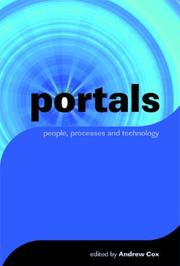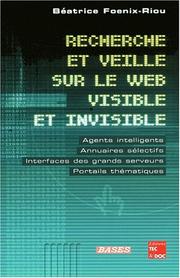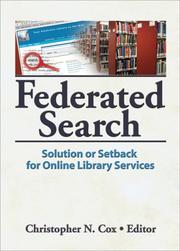| Listing 1 - 10 of 14 | << page >> |
Sort by
|
Book
ISBN: 0810891271 Year: 2014 Publisher: Lanham, Maryland ; London, England : Rowman & Littlefield,
Abstract | Keywords | Export | Availability | Bookmark
 Loading...
Loading...Choose an application
- Reference Manager
- EndNote
- RefWorks (Direct export to RefWorks)
Implementing Web-Scale Discovery Services: A Practical Guide for Librarians is a source for librarians seeking to evaluate, purchase, and implement a web-scale discovery service. The book breaks down each phase of the project into decision points and action plans to help librarians select and implement a system that meets their specific needs.
Online library catalogs. --- Online bibliographic searching. --- Federated searching. --- Library Web sites.
Periodical
Year: 2014 Publisher: Liege : University of Liege Library,
Abstract | Keywords | Export | Availability | Bookmark
 Loading...
Loading...Choose an application
- Reference Manager
- EndNote
- RefWorks (Direct export to RefWorks)
Online library catalogs. --- Federated searching. --- Library catalogs and users. --- Collection management (Libraries). --- Electronic information resources --- Libraries --- Libraries --- Management. --- Information technology. --- Automation.
Book
ISBN: 1782163697 9781782163695 1782163689 9781782163688 9781782163688 Year: 2013 Publisher: Birmingham : Packt Pub.,
Abstract | Keywords | Export | Availability | Bookmark
 Loading...
Loading...Choose an application
- Reference Manager
- EndNote
- RefWorks (Direct export to RefWorks)
To maximize the performance of your Liferay Portals you need to acquire best practices. By the end of this tutorial you’ll understand making the most appropriate architectural decisions, fine-tuning, load testing, and much more Learn best practices for architecting high performing Liferay- based solutions Practices for configuring a load balancer and cluster of Liferay portal Find out how to perform load testing and performance tuning activity for Liferay- based solutions In Detail Liferay portal is the leading horizontal portal product available in the market. It was named lLeader in Gartner's Magic Quadrant for Horizontal Portals. Because of the flexibility offered by Liferay Portal for customizations, it is becoming a preferred best choice for portal implementations. Many influential sites have been implemented with or have switched to the Liferay portal. More and more Liferay developers and architects are needed in the IT industry. Liferay Portal Performance Best Practices will guide you in how to build high performing Liferay -based solutions. The book guides you on how to define the architecture of Liferay- based solutions to meet performance expectations. You will learn how to fine- tune the Liferay portal using configuration changes or applying the right caching strategy. By the time you finish reading, you will realize that you know all the essential best practices to improve the performance of the Liferay portal solution. The book comprises of Liferay portal performance best practices related to various aspects. It starts with the architecture and design best practices and ends with performance tuning and lLoad testing best practices. The book follows the logical flow. In the first chapter it talks about various architectural options and best practices. It also talks about the consequences of various architectural options. It talks about how to configure the Liferay portal to work in a clustered environment. It discusses the various options available in a cluster configuration. The book further talks about various configuration options of different components that are available for improving performance. The book also talks about various development best practices. It concludes with best practices related to load testing and a performance tuning exercise. Liferay Portal Performance Best Practices explains performance best practices with real examples and samples. By the end of this book, the reader will have learned everything he/she...
Web site development --- Application software --- Web portals. --- Gateways (Web portals) --- Internet portals --- Portals (World Wide Web) --- Web sites --- Federated searching --- Web search engines --- Development of application software --- Computer programs. --- Development. --- Liferay Portal (Software)
Book
ISBN: 9780838914144 Year: 2016 Publisher: Chicago : ALA Editions, an imprint of the American Library Association,
Abstract | Keywords | Export | Availability | Bookmark
 Loading...
Loading...Choose an application
- Reference Manager
- EndNote
- RefWorks (Direct export to RefWorks)
In the context of libraries, "discovery" is the process of finding appropriate resources to meet an information need. We are in a new age of discovery where technology has enabled today's researchers to explore increasingly vaster realms of information more efficiently than ever before. What cutting-edge tools and services are emerging from the growing suite of discovery interfaces and indexes? Where is "discovery" going, and what tools and techniques are emerging as standard elements in the library technology toolbox? Exploring Discovery examines the range of discovery-focused tools and technologies being deployed by libraries and provides a series of case studies illustrating the interfaces and technologies that can be used by libraries today. The key topics covered include: * vendor-provided web scale discovery platforms * using discovery vendors in small and mid-sized libraries * libraries, archives and museums sharing a single discovery tool * custom discovery systems built with open-source software including Blacklight * discovery on a shoestring * integrating discovery to improve user experience * different discovery interfaces * metadata challenges in discovery services * Open Access and discovery tools * regional aggregation and discovery of digital collections. The book will be essential reading for library managers, systems librarians, metadata librarians, digital services librarians and anyone working in libraries, archives and museums looking to evaluate, implement, develop or improve discovery services.
Electronic information resource searching. --- Federated searching. --- Information retrieval --- User interfaces (Computer systems) --- Libraries --- Electronic information resources --- Informatique documentaire --- Interfaces utilisateur (informatique) --- Bibliothèques --- Sources d'information électroniques --- Computer programs. --- Special collections --- Electronic information resources. --- Management. --- Fonds spéciaux
Book
ISBN: 9781783300969 1783300965 Year: 2016 Publisher: London : Facet Publishing,
Abstract | Keywords | Export | Availability | Bookmark
 Loading...
Loading...Choose an application
- Reference Manager
- EndNote
- RefWorks (Direct export to RefWorks)
The pace of change in recent decades has been dizzying. An index of books was a static item; discovery might require searching several places to find both the index and the item. Now the variety of materials managed and collected by individual librarys is expansive, and the concept of "discovery" can cover hundreds, thousands or even billions of items. Where is "discovery" going... and how will it change your life? In the context of libraries, "discovery" is the process of finding appropriate resources to meet an information need. We are in a new age of discovery where technology has enabled today's researchers to explore increasingly vaster realms of information more efficiently than ever before. What cutting-edge tools and services are emerging from the growing suite of discovery interfaces and indexes? Where is "discovery" going, and what tools and techniques are emerging as standard elements in the library technology toolbox? Exploring Discovery examines the range of discovery-focused tools and technologies being deployed by libraries and provides a series of case studies illustrating the interfaces and technologies that can be used by libraries today. The key topics covered include: * vendor-provided web scale discovery platforms * using discovery vendors in small and mid-sized libraries * libraries, archives and museums sharing a single discovery tool * custom discovery systems built with open-source software including Blacklight * discovery on a shoestring * integrating discovery to improve user experience * different discovery interfaces * metadata challenges in discovery services * Open Access and discovery tools * regional aggregation and discovery of digital collections. The book will be essential reading for library managers, systems librarians, metadata librarians, digital services librarians and anyone working in libraries, archives and museums looking to evaluate, implement, develop or improve discovery services.
Information retrieval --- Electronic information resource searching. --- Federated searching. --- User interfaces (Computer systems) --- Libraries --- Electronic information resources --- Recherche de l'information électronique --- Recherche fédérée --- Recherche de l'information --- Interfaces (Informatique) --- Bibliothèques --- Sources d'information électroniques --- Computer programs. --- Special collections --- Electronic information resources. --- Management. --- Programmes d'ordinateur --- Fonds spéciaux --- Gestion --- Recherche de l'information électronique --- Recherche fédérée --- Bibliothèques --- Sources d'information électroniques --- Fonds spéciaux --- Electronic information resource searching --- Federated searching --- Computer programs --- Management --- Information Storage and Retrieval --- Research Support as Topic --- Library Services --- Information retrieval - Computer programs --- Libraries - Special collections - Electronic information resources --- Electronic information resources - Management
Book
ISBN: 9782843650918 Year: 2007 Publisher: Paris ADBS
Abstract | Keywords | Export | Availability | Bookmark
 Loading...
Loading...Choose an application
- Reference Manager
- EndNote
- RefWorks (Direct export to RefWorks)
Online bibliographic searching --- Information storage and retrieval systems --- Library science --- Recherche documentaire automatisée --- Systèmes d'information --- Bibliothéconomie --- Software --- Computer programs --- Logiciels --- Federated searching --- Web portals --- BPB0805 --- 621.39* --- 002 --- AA / International- internationaal --- 020 --- Internet --- Informatieverzorging i. v. m. documentatie --- Bibliotheekwezen: algemeenheden. --- 002 Informatieverzorging i. v. m. documentatie --- 621.39* Internet --- Recherche documentaire automatisée --- Systèmes d'information --- Bibliothéconomie --- Bibliotheekwezen: algemeenheden

ISBN: 1856045463 9781856045469 9781856049832 1856049833 1306342295 Year: 2006 Publisher: London
Abstract | Keywords | Export | Availability | Bookmark
 Loading...
Loading...Choose an application
- Reference Manager
- EndNote
- RefWorks (Direct export to RefWorks)
First applied to internet gateways such as Yahoo, the concept of the portal" has evolved in a bewildering number of directions. Different themes of personalization, aggregation or integration seem to have dominated our understanding of what a portal should be at different times. Many organizations and institutions have borrowed the idea from the net to address local problems of integrating and presenting information sources to users - yet they have developed the concept in different ways. Meanwhile new models seem to be constantly emerging from the internet. Tracking this evolving concept is clearly of particular concern for information services. How can they best take advantage of internet portals to improve access to resources? What are the requirements for delivery of diverse content through a local portal? And how do portals run by libraries relate to wider organizational initiatives? This edited collection seeks answers to these questions, providing the library and broader information community with an overview of how portals are currently being used.
Web portals --- Internet --- Portails (Informatique) --- 025:681.3 --- 025:681.3 Bibliotheekautomatisering --- Bibliotheekautomatisering --- Gateways (Web portals) --- Internet portals --- Portals (World Wide Web) --- Web sites --- Federated searching --- Web search engines --- DARPA Internet --- Internet (Computer network) --- Wide area networks (Computer networks) --- World Wide Web --- Web portals. --- Internet.
Book
ISBN: 1484285638 148428562X Year: 2022 Publisher: New York, New York : Apress Media LLC,
Abstract | Keywords | Export | Availability | Bookmark
 Loading...
Loading...Choose an application
- Reference Manager
- EndNote
- RefWorks (Direct export to RefWorks)
Explore the development and customization of OSGi modules in Liferay DXP and choosing the right underlying technology for it. The book starts with the basic Liferay Architecture to understand how things work in Liferay DXP, as well as in OSGi. Next, you'll understand Blade CLI, Liferay workspace and how you can develop portlet modules in different module templates. Once you are familiar with portlet modules, you'll explore some advance concepts such as Inter Portlet Communications (IPC), message bus etc. Moving on, you'll understand about building service layer using service builder and exposing web services. Later chapters will cover how to customize the default behavior of Liferay, Liferay services, and user interface using Hooks. Additionally, this book will cover topics like Gogo shell, xxpando attributes, basic integration with the Liferay search framework etc. By the end of this book, you should be able to develop portlet modules in Liferay DXP and customize the default Liferay behavior.
Java (Computer program language) --- Web portals. --- Open source software. --- Free software (Open source software) --- Open code software --- Opensource software --- Computer software --- Object-oriented programming languages --- JavaSpaces technology --- Gateways (Web portals) --- Internet portals --- Portals (World Wide Web) --- Web sites --- Federated searching --- Web search engines --- Web portals --- Computer programs. --- Liferay Portal (Software)

ISBN: 2914509014 2743004509 9782914509015 Year: 2001 Publisher: Paris : BASES : Tec & Doc,
Abstract | Keywords | Export | Availability | Bookmark
 Loading...
Loading...Choose an application
- Reference Manager
- EndNote
- RefWorks (Direct export to RefWorks)
Internet research --- Web portals --- Internet --- Besoin d'information --- information needs --- Système d'information --- information systems --- Recherche de l'information --- Information retrieval --- Web Web --- Internet Internet --- Information Informatie --- Site Web Website --- Internet searching --- World Wide Web --- Recherche sur Internet --- Web --- Handbooks, manuals, etc. --- Guides, manuels, etc --- Gateways (Web portals) --- Internet portals --- Portals (World Wide Web) --- Web research --- Methodology --- 020 --- 654 --- AA / International- internationaal --- NBB yearbooks --- Bibliotheekwezen: algemeenheden --- Informatieverwerking. Bureautica --- Yearbooks --- Web sites --- Federated searching --- Web search engines --- Research

ISBN: 9780789036605 0789036606 Year: 2008 Publisher: Binghamton Haworth Press
Abstract | Keywords | Export | Availability | Bookmark
 Loading...
Loading...Choose an application
- Reference Manager
- EndNote
- RefWorks (Direct export to RefWorks)
AA / International- internationaal --- 020 --- 654 --- Bibliotheekwezen: algemeenheden. --- Informatieverwerking. Bureautica. --- Federated searching --- Internet in library reference services. --- Library Web sites. --- Recherche fédérée --- Internet dans les services de référence (Bibliothèques) --- Sites Web de bibliothèques --- Recherche fédérée --- Internet dans les services de référence (Bibliothèques) --- Sites Web de bibliothèques --- Internet in library reference services --- Library Web sites --- Web sites --- Web librarianship --- Internet in reference services (Libraries) --- Reference services (Libraries) --- Internet searching --- Web portals --- Bibliotheekwezen: algemeenheden --- Informatieverwerking. Bureautica
| Listing 1 - 10 of 14 | << page >> |
Sort by
|

 Search
Search Feedback
Feedback About UniCat
About UniCat  Help
Help News
News